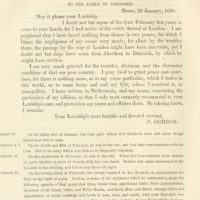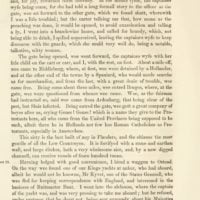![1666] DIARY OF PATRICK GORDON. 67 Mosco, the fyfth of July 1666] DIARY OF PATRICK GORDON. 67 Mosco, the fyfth of July](https://cdn2.picryl.com/photo/1699/12/31/1666-diary-of-patrick-gordon-67-mosco-the-fyfth-of-july-5a83f2-1024.jpeg)
Related

68 DIARY OF PATRICK GORDON. [1666 24. I did wrltt to Mosko, to my wyfe and mother in law
![1692] DIARY OF PATRICK GORDON. 175 TO HIS SON JOHN. Mosco, January 11, 1692.](https://cdn2.picryl.com/thumbnail/1699/12/31/1692-diary-of-patrick-gordon-175-to-his-son-john-mosco-january-11-1692-febf72-200.jpeg)
1692] DIARY OF PATRICK GORDON. 175 TO HIS SON JOHN. Mosco, January 11, 1692.

84 DIARY OF PATRICK GORDON. [1666 July the twentieth and twenty fourth

106 DIARY OF PATRICK GORDON. [1678 He notes that, on the eleventh of July
![1666] DIARY OF PATRICK GORDON. 69 evening, wee sailed by it, and Bornholme](https://cdn2.picryl.com/thumbnail/1699/12/31/1666-diary-of-patrick-gordon-69-evening-wee-sailed-by-it-and-bornholme-0599fe-200.jpeg)
1666] DIARY OF PATRICK GORDON. 69 evening, wee sailed by it, and Bornholme

168 DIARY OF PATRICK GORDON. [1690 The twenty-eiglith of January

76 DIARY OF PATRICK GORDON. [1666 the cart was ready
![1666] DIARY OF PATRICK GORDON. 79 I did writt to Sir John Hebden](https://cdn2.picryl.com/thumbnail/1699/12/31/1666-diary-of-patrick-gordon-79-i-did-writt-to-sir-john-hebden-64f584-200.jpeg)
1666] DIARY OF PATRICK GORDON. 79 I did writt to Sir John Hebden

62 DIARY OF PATRICK GORDON. [1666 purpose to convoy
1666] DIARY OF PATRICK GORDON. 67 Mosco, the fyfth of July
Summary
Passages from the diary of General Patrick Gordon of Auchleuchries : A.D. 1635-A.D. 1699"
1666] DIARY OF PATRICK GORDON. 67
Mosco, the fyfth of July, [16] 66 ; another dated the twenty ninth of June,
tlie first per post, and the last per fFriend 5 a letter also from Doktor Colins,
dated the fyfth of July.
My old acquaintance the governour, Lievetennant General Fabian dc -Tuiy 21.
Fersen, sent an officer to welcome me, and told me he was very desirous to
speake with me, invitcing me to his lodgings. I rendrcd thankes, and bid
tell him, that I would pay my respects to him in the aftcrnoone.
Haveing dined, I sent for Mr. AylofFe, and desired him to accompany
me to the governour ; whither being come, he received me with a great deale
of kindnes, and after much discourse of old passages, he began to insinuate
the great inclination they * had to preserve the peace, and seemed to doubt
of the lyke sincerity in us; and among other things told me, how that some
dayes ago, a party of ours had come to the borders, and in a manner of
bravado had made a great noise with sounding of trumpets and shooting,
and thereby had put the countrey in a great feare and alarum. Which I
considering, told him that possibly it might be a mistake, and that it might
arise from my comeing to the borders, whither some ffriends from Plesko
had convoyed me, and at parting had, in mirth, shott some shotts, and
sounded trumpets. Wherewith he was satisfyed, and partly ashamed, that,
without ground, they should be so soone alarumed. Afterwards wee began
to pass the tyme with hearty cups. Parting, he sent me home to my
lodgings, in a coach, with servants and lacqueyes convoying me. At my
comeing to my lodging, I gave to each of the better sort who had convoyed
me, a ducat, and to the other, a reichs doller, a piece ; which was by farr too
much. I writt to Mr Bryan.
I dined at home with some ffriends, and in the afteruoone was merry juiy 22.
with them.
I exchanged a hundred rubles for reichs dollers, giveing fyfty eight copikes juiy 2.3.
for a reichs doller, most whereof Hollands, which was no good bargaine.
Mr. AylofFe hired my passage in a vessel to Lubeck for twelve reichs
dollers for my self and people, and I to have the cabinet, and promissed to
provide all sort of provisions for me. 1 dismissed the fuirmenf which I had
from Plesko, and wrott with them to ffriends there, and by the sotnik to the
governour, thanking him for his kindnes.
* [That is, the Swedes.] f [Postillions.]
Gordon was brought up and remained a lifelong Roman Catholic, at a time when the Church was being persecuted in Scotland. At age of fifteen, he entered the Jesuit college at Braunsberg, East Prussia, then part of Poland. In 1661, after many years experiences as a soldier of fortune, he joined the Russian army under Tsar Aleksei I, and in 1665 was sent on a special mission to England. After his return, he distinguished himself in several wars against the Turks and Tatars in southern Russia. In recognition of his service he was promoted to major-general in 1678, was appointed to the high command at Kiev in 1679, and in 1683 was made lieutenant-general. In 1687 and 1689 he took part in expeditions against the Tatars in the Crimea, being made a full general. Later in 1689, a revolution broke out in Moscow, and with the troops under his command, Gordon virtually decided events in favor of Peter the Great against the Regent, Tsarevna Sophia Alekseyevna. Consequently, he was for the remainder of his life in high favor with the Tsar, who confided to him the command of his capital during his absence from Russia. In 1696, Gordon's design of a "moveable rampart" played a key role in helping the Russians take Azov. One of Gordon's convinced the Tsars to establish the first Roman Catholic church and school in Muscovy, of which he remained the main benefactor and headed the Catholic community in Russia until his death. For his services his second son James, brigadier of the Russian army, was created Count of the Holy Roman Empire in 1701. At the end of his life the Tsar, who had visited Gordon frequently during his illness, was with him when he died, and with his own hands closed his eyes. General Gordon left behind him a uniquely detailed diary of his life and times, written in English. This is preserved in manuscript in the Russian State Military Archive in Moscow. Passages from the Diary of General Patrick Gordon of Auchleuchries (1635–1699) was printed, under the editorship of Joseph Robertson, for the Spalding Club, at Aberdeen, Scotland, 1859.
